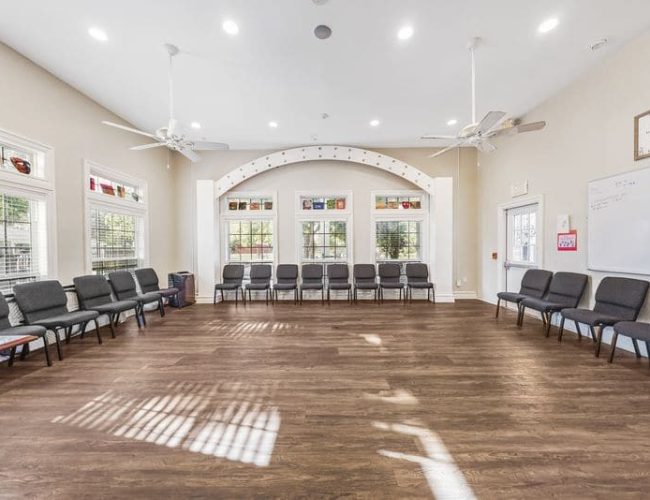Residential Rehab in Houston, Texas
Residential Rehab
With their lives in general disarray, long-term drug or alcohol users need to make comprehensive changes. In some regards, they need to relearn how to live what most people would consider a “normal” life.
Our residential rehab in Houston can help
Contact us today to get started.
At Kemah Palms, our inpatient rehab, also known as residential rehab in Houston offers a comprehensive treatment program tailored to individuals struggling with addiction and mental health challenges.
If you or a loved one is struggling with addiction or dual-diagnosis disorders, understanding the importance of appropriate treatment is crucial. Our Houston residential rehab provides clients with 24/7 care in order to help them through addiction and mental health disorders.
Our facility provides a safe, structured environment to provide solace and healing where clients can focus on stabilization, growth, and recovery.
Learn more about our addiction treatment programs in Houston or call us now at 571-630-3366.

What is Residential Rehab?
Residential rehab, also known as inpatient rehab, is a structured treatment program where individuals live at the facility while receiving intensive therapeutic care.
With round-the-clock medical and therapeutic support, clients have access to professional care whenever they need it, helping them manage withdrawal symptoms in detox and mental health challenges, fostering resilience in recovery.
Studies show that individuals who complete residential rehab programs are more likely to stay sober longer compared to those who only attempt outpatient care or self-managed recovery.
How Do I Know I Need Residential Rehab?
If you find yourself unable to manage your daily life due to addiction or mental health challenges, chances are, inpatient rehab may be a good fit for you. Other indicators that treatment may be necessary include addiction to substances like opioids, fentanyl, methamphetamine, kratom, or any other addictive substance.
If you’ve tried outpatient rehab and continue to find yourself relapsing, inpatient or residential rehab may be the next step.
Other indicators that you may need residential rehab include:
- You’ve tried to quit drugs or alcohol but haven’t been successful on your own.
- You’ve experienced frequent relapses after attempting recovery.
- Your substance use is affecting your health, relationships, or daily responsibilities.
- You’ve developed a high tolerance and need more of the substance to feel the same effects.
- Withdrawal symptoms occur when you try to stop using drugs or alcohol.
Conditions We Treat
At Kemah Palms, we believe that addiction is a mental health disorder. We’re committed to treating a wide range of behavioral health issues and helping each client find the right path of recovery that works for them, no matter what they’re struggling with.
Dual Diagnosis: For individuals struggling with both addiction and mental health issues, dual diagnosis treatment is crucial. We treat conditions like depression, anxiety, PTSD, and bipolar disorder alongside substance use, ensuring clients receive care for both problems simultaneously.
Alcohol Use Disorder: Alcohol use disorder is complex, impacting both physical and mental health. Our residential rehab program addresses the root causes of alcoholism, offering detox services, therapy, and relapse prevention tools to help individuals achieve and maintain sobriety.
Drug Addiction: Whether you’re struggling with opioids, methamphetamine, cocaine, or other substances, our drug addiction treatment program provides detox, therapy, and holistic support to help clients overcome their addiction and build a healthy lifestyle.
Mental Health Disorders: We treat a range of mental health issues, including depression, anxiety, PTSD, bipolar disorder, and more. Through therapy and holistic treatments, we help clients manage symptoms and improve their overall well-being.
Residential Rehab Therapy Styles
At Kemah Palms, we give each client a range of options to help them find the best method that works the best.
Our core therapy styles include:
Equine Therapy: Working with horses can be incredibly therapeutic. This hands-on approach helps build confidence, trust, and emotional awareness.
Dialectical Behavior Therapy (DBT): DBT focuses on building emotional regulation and distress tolerance skills to help clients manage intense emotions and reduce harmful behaviors.
Cognitive Behavioral Therapy (CBT): CBT is an evidence-based approach that helps individuals identify and change negative thought patterns that contribute to addiction and mental health challenges.
Individual Therapy: One-on-one counseling sessions allow clients to dive deep into their personal struggles and develop coping strategies with the guidance of a licensed therapist.
Art Therapy: Creative expression through art helps clients explore their emotions, relieve stress, and build self-esteem during recovery.
Music Therapy: Music can be a powerful tool for healing, helping individuals connect with their emotions and find peace during treatment.
Family Therapy: Addiction and mental health issues often impact family relationships. Our family therapy sessions work to rebuild trust and improve communication within the family unit.
Sound Therapy: Using sound vibrations, this therapy promotes relaxation, reduces stress, and enhances emotional balance.
12-Step Programming: We integrate 12-step principles into our program to offer clients a structured, supportive framework for long-term recovery.
What Happens Once Inpatient Rehab is Complete?
We offer a full continuum of care so individuals can continue on the path of recovery once residential treatment is completed.
If clinically appropriate, after completing inpatient rehab, clients can transition to lower levels of care to continue their recovery journey, which include:
Partial Hospitalization Program (PHP): PHP offers structured treatment during the day, allowing clients to return home or to sober living in the evenings.
Intensive Outpatient Program (IOP): IOP provides flexibility for clients who need continued support while balancing work, school, or family responsibilities. Clients attend therapy sessions several times a week while living at home or in a sober living home.
Are you ready
Find Residential Rehab in Houston Today
If you or a loved one are ready to start the journey toward recovery, our Houston residential rehab is here to help.



